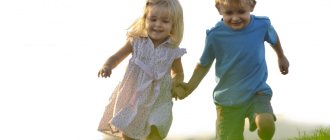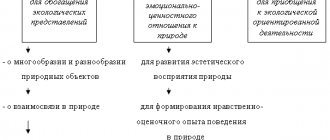Parent meeting in kindergarten. Problems of education
Lesson summary with elements of training for parents “Problems of Education”
This development will be useful for class teachers, teachers and psychologists of educational institutions.
A lesson with training elements is one of the non-traditional forms of working with parents. This form of work allows not only to acquaint parents with the theoretical aspects of the problem, but also to practice the acquired knowledge in practice. This lesson is aimed at harmonizing child-parent relations, increasing the pedagogical competence of parents in matters of raising children. Lesson with elements of training for parents “Problems of education” Objectives: 1. Inform group participants about the mistakes of family education; 2.Formation of educational confidence of parents; 3. Developing a sense of parental responsibility Welcome ritual. Warm up. Exercise “What we have in common” Goal: reducing emotional stress Participants are asked to find something in common with each other (“how we are alike”). Exercise “Handshake” Purpose: to activate the participants, to put them in a positive mood. The group is divided into two teams. The leader stands at the head of one team. His team approaches the opposing team and shakes hands with each of them. The presenter begins this greeting - a handshake. Handshake options: greet with your left hand, pat your opponent on the shoulder, and at the same time say encouraging words. The exercise ends when everyone has greeted all competitors. Discussion:
-Did you like this exercise?
-How did you feel while doing this exercise? Main part. Exercise “Vicious Circle” Purpose: to analyze specific educational situations. At the request of group members, specific educational situations in students’ families are analyzed. Psychological conversation “Mistakes in family education” Goals: increasing the psychological and pedagogical competence of parents As you know, all human problems come from childhood. We, parents, and only we, are responsible for all the mistakes made in raising our children. So let's not allow them to happen! Mistake 1. “Everything will be my way!” This parenting style is called authoritarian. If parents often talk to a child in a demanding tone, humiliate, punish him, if they constantly impose their vision of the situation on him and limit his independence - this will only bring harm; by showing violence, parents not only do not help, but prevent the child from developing. Error 2. “No concessions! » Children must be brought up in strictness. It is not right. This approach is based on parental fear. Adults are afraid that children will “sit on their necks.” Such children are deprived of maternal affection. This subsequently often results in a severance of contacts with parents. Mistake 3. “If you don’t…then I will.” Sometimes parents play on the child’s feelings: a feeling of fear (“If you don’t go to bed now, I won’t love you”). In the end, the child understands that all threats remain unfulfilled. This accustoms the child to the idea that promises are not made in order to keep them. Mistake 4. “It will grow on its own!” Parents who “don’t care” believe that the child should be given complete freedom of action. They do not try to invest at least some life values in the child, they do not delve into his problems. If a child is not given life guidelines, he will begin to look for them outside the home, deciding that his parents don’t care about him. Mistake 5. “Excessive guardianship.” Excessive care for a child can lead to various violations of his behavior. It will be difficult for the child to communicate with the guys; he will not be able to make decisions on his own. Mistake 6. “Children need to be spoiled.” Here we are talking about permissiveness. Remember, as the chieftain of a gang of robbers said in the film “The Snow Queen”: “Children need to be pampered - then they will grow up to be real robbers!” As a rule, this recipe works: if a child grows up with the confidence that the whole world revolves around him, then he gradually turns into an egocentrist (everyone owes him something). Mistake 7. “Parents are people too!” Many parents can afford to lash out at their child on occasion: yell at him and even spank him. This behavior leads to the fact that the child develops a feeling of guilt, which leads directly to psychological complexes. Error 8. “Carrot and stick!” At first glance, everyone suggests to the child that if he behaves well, he will receive a “carrot”, for example, they will buy him something, but if he behaves badly, he will have to endure hardships. As a result, the child begins to treat his parents as a consumer. Analysis of the diagnostic results of parents (Varga-Stolin test) Purpose: analysis of the system of education in the family Exercise “Applause” Purpose: reduction of tension Participants are asked to stand in a circle. One of the participants comes to the center of the circle. Everyone else applauds him, providing psychological support. Each participant must be in the circle. After he thanks the group, the next one comes out. Discussion: -How did you feel when you were applauded? — Did you like this exercise? Exercise “Remembering your childhood” Goal: learn to apply parental positions and attitudes. Parents are invited to look back at their past and remember their naive and inconsistent actions committed in childhood. Pay attention to naive behavior in childhood. In past. Think about what caused it and ask for examples from childhood memories. Discussion:
-What images did you have?
-Did you manage to see the whole picture? - How did you feel during the memory? -Did you like this feeling? Exercise “Life Planning” Goal: developing goal-setting skills “Formulate the three main goals of your life. Next to each, write briefly why they are important to you, by when should they be implemented? Indicate the factors that facilitate and hinder their achievement by answering the questions: - Are there any obstacles to achieving the goals? -How to overcome them? — What do you need to achieve your goals (time, money, help from loved ones, sacrifice your interests). Write down goals and activity plans that will help you achieve your goals. To achieve my life goals Activities to realize goals Time In the field of health: In the field of parenthood: In the professional field: Other: Reflection. Parents in a circle: characterize their emotional state, exchange opinions and feelings about the lesson (liked - didn’t like, what seemed most important and useful, what they felt, what thoughts came to mind, etc.). Exercise “I liked it most” Goal: learning how to respond to emotions The participants of the training remember the past classes - what they liked the most, share their impressions of what the classes gave for everyone, what new things they learned. Final word from the presenter: For the normal development of a person of any age, constant, open and trusting relationships with others, built on a positive emotional basis, are necessary. A properly built relationship with a child helps parents successfully solve difficult internal problems that concern their child. Ritual of farewell.
We recommend watching:
Do children need fairy tales? Parent meeting in the preparatory group. Family and family traditions Non-traditional parent meeting in kindergarten Non-traditional parent meeting in the middle group of kindergarten
Similar articles:
Parent meeting in the middle group. Family traditions
Parent meeting in the middle group. Our grandparents in the family
Parent meeting in the middle group. Child's emotional well-being
Parent meeting in the middle group on the topic “Healthy lifestyle”
Parent meeting in the middle group. Reading fiction
Problems of raising preschool children in the family
How does the “little loser” type of upbringing manifest itself?
You can often observe how parents and other significant adults consider the child unadapted to the “difficulties” of real life and try to do a lot for him.
This type of education is distinguished by the fact that in relation to the child, the dominant desire of adults is to attribute personal and social failure to their child. That is, in the eyes of adults, their child appears as a potential loser, infantile, overly vulnerable, and younger than his real age. And in order to prevent his failures, it is necessary, in their opinion, to perform some of the actions for him.
With such an attitude, parents (often unconsciously) do not trust their child and are annoyed at his ineptitude. They are embarrassed in front of others that their preschooler may not be able to cope with any task, while other children show great savvy and grasp it on the fly.
This type of education does a lot of harm to the development of a preschooler. At this age, a child learns everyday and social wisdom solely through trial and error. Adults, by depriving a child of the opportunity to practice the necessary actions, hinder his development and create self-doubt. It’s not just the timely acquisition of necessary skills that is delayed. The position of a “little loser” affects the formation of self-esteem.
This does not mean that parents should refuse help and support for their child. Of course, a preschooler needs them. Only when helping, adults need to believe that the child will cope; It is important to encourage his independence and initiative.
Features of speech development in modern preschoolers: problems and tasks
The child of the 21st century is different in many ways: more free, spontaneous, independent. At the same time, experts note a decrease in speech skills: a small vocabulary, difficulties in coherent speech (not spontaneous), low communication culture, not to mention the sound aspect of speech (pronunciation). It is important to understand the main thing - a child’s personal development is formed through speech. The level of speech development of preschoolers is influenced by reading, knowledge of proverbs, sayings, riddles, possession of communicative competencies, etc.
Watch webinars on preschool education
Language acquisition is an active creative process that adults organize. The child himself is ready for communication from infancy, but what about his environment? The first role model for a child is the speech of the mother; the speech of the kindergarten teacher has no less influence on the child. Therefore, of course, the speech culture of teachers must be at a very high level. But what do we see today? The results of studies conducted by the IRO show that the level of speech of modern teachers is lame: the vocabulary is small, grammatical structures are simple, expressiveness (tempo, diction, fluency, intonation) leaves much to be desired.
In this regard, complex tasks are preferable, when different developmental tasks are integrated into one topic: if children are interested in an activity, they do not notice how they are learning. This, as we know, happens through play. Staging and theatrical performances can help here, because joint activities of adults and children are one of the organizational models for carrying out educational activities in accordance with the Federal State Educational Standard. The second important type of activity is independent work, but it will not arise if there was no experience of the first.
The material was prepared based on the webinar “Speech development of modern preschoolers. for the new generation .”
Watch the webinar recording
Lyudmila Kozhurina
To help a preschool education specialist
UMK "Tropinki" is a system of benefits for teachers and kindergarten students. The work is carried out in five areas: the development of a culture of communication, cognitive activity and creative abilities, speech development, and physical training. Children develop productive imagination, curiosity, orientation to the position of another person, strong-willed qualities, elements of reflection, etc. Particular attention is paid to methods for diagnosing results and working with children who have poor health.
The tasks contained in the “Speech Development” manual allow you to develop the lexical side of a preschooler’s speech: they reinforce the idea of polysemantic words and homonyms; They train in the selection of synonyms, in composing sentences and coherent stories. Exercises contribute to the development of a sense of language, awaken interest in words, the desire to talk, listen, read, which is a necessary condition for the mental development of a child and the development of a culture of speech in general.
View product catalog
Current problems of modern preschool education
Undoubtedly, the period of preschool education is an important stage in the development of a child. It is in preschool age that all the basic personality traits are formed in a child, and the quality of his further physical and mental development is determined. If you ignore the peculiarities of a child’s development at this age, this may adversely affect his future life.
Currently, there are problems in modern preschool education. Let's pay attention to the child's communication. Full communication is impossible without communication skills, which need to be developed from childhood. Communication must include the ability to hear and listen, the ability to make contact with peers and adults, the ability to express one’s thoughts, and understand speech. One of the means of developing communication skills is role-playing play, which often remains without due attention from educators. And it often happens that the teacher conducts a role-playing game only at the request of the children.
The next topic is family. Today there are a large number of single-parent families where children are raised. This is where problems arise. When a parent has no time to care for his child, he is left to his own devices, and the result of such “free” development may not be what the parent expects. Most modern parents do not want to cooperate with preschool educational organizations, citing employment reasons.
In addition, the basic knowledge system has ceased to play its former role today. For a person of the twenty-first century, what is much more important is not the amount of basic knowledge acquired in the family or school, but what he hears on the radio, sees on TV, reads in the newspaper, learns from the conversations of people around him.
What should modern education be like? Let's consider several different lines presented in the practice of modern educational space.
The first is that the teacher and adults independently organize work with children. Before school, a child absorbs information like a “sponge”; he is often active in learning new things and is interested in new things. Hence, adults have a desire to take advantage of this period and slightly “shift” the time when the child goes to school by a year or a couple of years. And there are two options here. In the first case, the adult wants to leave the child in kindergarten for a longer period of time. In the second case, the parent insists that the child needs to go to school earlier, paying attention only to his physiological readiness for school and completely forgetting about his psychological readiness for school. This shows that the practice of early teaching children knowledge, skills and abilities can lead to the disappearance of educational motivation in the future. And it can often happen that a child studies the first grade program twice. Such negative effects include children’s loss of interest in learning, problems with continuity in the education system between kindergarten and primary school. A child’s knowledge does not determine the success of his learning; it is much more important that the child independently obtains and applies it.
Secondly, education is built taking into account the interests of the child himself and the interests of his family, i.e. his legal representatives. The student-centered approach is aimed at a developmental type of education. It takes into account age and individual characteristics and focuses on the interests of each child. But I would like to note that not every teacher can see these features in developmental education. And not every child can achieve the goals of developmental education due to a number of reasons. The teacher must set a goal - to ensure development with the help of knowledge and skills. If the child is quite active and inquisitive, we can assume that a development process is underway.
Thus, there are problems in modern education. Without communication, it is impossible to develop the communicative side of a child’s personality. Without the cooperation of parents and kindergarten, the full development of the child is impossible. It is necessary to influence parents in such a way that they try to be with the child throughout preschool age and help him. More effective teaching is one that involves a person-centered approach, but everything depends on the teacher, on his goals, what the teacher puts in the foreground, what in the background. And it depends on teachers whether problems in modern education will be solved or not.
Literature:
- Mynto T.V. Current problems of modern preschool education // Social network of education workers nsportal.ru. [Electronic resource]. — Access mode: https://nsportal.ru/detskiy-sad/raznoe/2012/11/29/aktualnye-problemy-sovremennogo-doshkolnogo-obrazovaniya.






